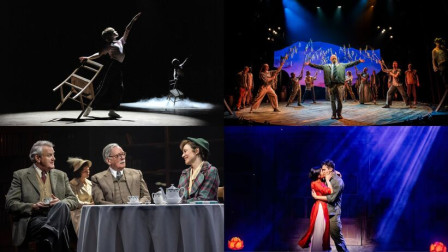Review: DA VINCI'S LAUNDRY at Riverside Studios
Using much of the same comedy styling and delivery as he used previously in Thanks For Having Me, (shown at the same venue in April) actor/playwright Keelan Kember brings a touch of farsical nonsense to his latest, wryly observed comedy, about the international art market — prompted by the Salvator Mundi sale and controversy.
 The cast of Da Vinci's Laundry. Photo by Teddy Cavendish.
The cast of Da Vinci's Laundry. Photo by Teddy Cavendish.
A Russian oligarch Boris (John Albasiny who may have been a last minute replacement in the cast) has a Da Vinci of dubious provenance and still more dubious authenticity. Auction house colleagues Christopher (also Kember) and Milly (Arsema Thomas) have been sent by Beauchamps to authenticate the artwork with a view to selling it. Unfortunately, it’s apparently been ‘touched up’ by a restorer named Diane (a thread which evaporates without trace) and the prospective consignee claims to have bought it at a flea market. There’s also the small and inconvenient matter of his likely connections to the Russian mafia.
With such an unlikely set-up, it’s not long before the auction house colleagues are developing an attack of nervous morality. This is despite being encouraged to overlook the painting’s shortcomings and its seller’s unscrupulous business dealings, by an equally unethical American MAGA-loving art procurer. Tony (Steve Zissis) who inexplicably bounds unannounced into the opening scene set at the seller’s heavily guarded Swiss mountainside home, wants the painting to come to market so that he can buy it for hisobscenely rich client, a Middle Eastern prince (played by Fayez Bakhsh) thereby earning himself a huge finder’s commission. Bribes and thinly veiled threats involving 100ft balcony drops are mentioned as the scattergun plot begins to unravel. The audience is encouraged to believe that the crass and vulgar yank has a heart of gold and just wants the two art assessors to fall in love… assuming they can survive their post-sale rendezvous with the oligarch at which the prince makes an unannounced visit with 5 bodyguards in tow, determined to right wrongs. Deals appear to be struck, friendships formed, but then gunshots are fired.
In truth, there’s potential here, (The Art Deal That Goes Wrong) but in its present form, there’s not a moment when this silly farce truly ignites. Kember and Zissis manage to score a scene of pacy patter through sheer energy, but the unmapped plot and cardboard characters feel superficial and underwritten. As a consequence, the actors are left adrift, paddling furiously in a sea of smart-arse asides in a thankless attempt to gloss over the multiplicity of loose threads and spuriously unrealistic scenarios.
Directed by Merle Wheldon on a set by regular collaborator Eleanour Wintour, this feels a rushed and unready effort and not therefore the follow-up many of us were hoping for, from Mr Kember. He remains one to watch, but banter-ish and snappy line delivery in isolation, are sufficient only for sketch shows. The piece needs stripping back to the narrative structure and some heavy reworking if it is to be a farce which makes sense, or indeed, have any future.
DA VINCI’S LAUNDRY runs 1 hour and 20 mins and continues at Riverside Studios until 25th October.
Latest News

 This Month in the West End (February 2026)
27 February 2026 at 16:45
This Month in the West End (February 2026)
27 February 2026 at 16:45

 Cameron Mackintosh reveals extension periods for West End productions to 2027
27 February 2026 at 16:08
Cameron Mackintosh reveals extension periods for West End productions to 2027
27 February 2026 at 16:08

 TITANIQUE announces fourth extension
27 February 2026 at 15:55
TITANIQUE announces fourth extension
27 February 2026 at 15:55

 Florian Zeller’s Olivier Award-nominated comedy 'The Truth' to head to the West End this summer
27 February 2026 at 11:06
Florian Zeller’s Olivier Award-nominated comedy 'The Truth' to head to the West End this summer
27 February 2026 at 11:06
